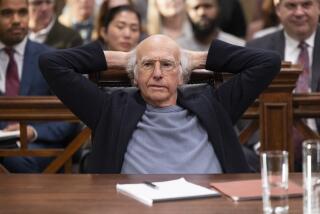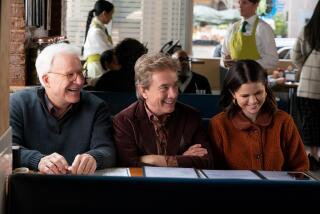‘Breaking Bad’ finale: The critics weigh in on ‘Felina’
In case you hadn’t heard, “Breaking Bad” came to an end Sunday night in a finale that favored closure over ambiguity. Chemistry teacher-cum-murderous drug lord Walter White went out not in a head-scratching fade-to-black, a la Tony Soprano, but in an unambiguous, bloody farewell set to the tune of Badfinger’s “Baby Blue.”
Along the way, he found a way to get his remaining $9 million meth fortune to his son, said farewell to his daughter Holly, alerted Skyler to the whereabouts of Hank’s remains, came clean about his motives for cooking meth, liberated Jesse and killed a bunch of neo-Nazis using a jury-rigged assault rifle. If the finale didn’t tie up every single narrative loose end -- alas, we’ll probably never know what became of poor Huell -- it came pretty close.
PHOTOS: Behind the scenes of ‘Breaking Bad’
And that’s precisely what seems to be dividing the critics Monday morning, who so far seem divided between two camps. Either “Felina” completely stuck the landing, to use a gymnastics metaphor, or it was too neat by half.
Here’s a rundown of the reactions so far.
The Good:
- Mary McNamara, the Los Angeles Times: “Not only did Vince Gilligan’s five-season, hyper-violent prose poem to midlife male frustration tie up virtually every loose end in sight, it contained the Holy Grail of all storytelling: an Actual Moment of Truth. And not just this particular story’s truth, but one that extended to the beloved and bloated genre Gilligan both elevated and mocked.”
- Alessandra Stanley, the New York Times: “Perhaps the best thing about the finale of “Breaking Bad” is that it actually ended. So many shows, notably “The Sopranos” and “Lost,” have gone dark without anything approaching finality. Here, the writers were so determined to not leave unfinished business that the last episode was called “Felina,” an anagram of finale. And almost every loose end was tied. In some cases, a little too tightly, and in others, not quite as much.”
- James Poniewozik, Time: “What ‘Felina’ was–as effective, satisfying series finales are–was true. It was true to the five seasons that preceded it, true to Walter White’s obsessions and pride, and true to what Breaking Bad is at heart: a Western.”
- Robert Bianco, USA Today: “Tense, witty, violent, oddly tender and, in its own strange way, as close to a ‘happy’ ending as a story this dark could hope, this last episode brought the story to a straightforward, definitive conclusion, without the spirituality of ‘Lost’ or the ambiguity of ‘Sopranos.’ If it’s debated, it won’t be for what it meant, but for what it did: Killing Walt, but leaving Jesse alive and Walt’s family rich.”
- Donna Bowman, the A.V. Club: “We’ve all been asking ourselves what we want from this show. I’ve tried not to commit myself in writing to wanting anything, beyond Jesse’s getting out alive, because more than anything I wanted to let Vince Gilligan take us where he wanted us to go. But now I can say what I wanted. I wanted the special thrill that comes when the forces of luck and the forces of human will coincide to make miracles happen. And on this show, that has happened to Walt again and again in the service of his own ego. The end has been dreadful, but the means have been intoxicating. When Walt pounded the window of that stolen car with his fist, causing the snow to fall away, it was like the Fonz thumping the jukebox: a moment of supreme efficacy, endorsed by the universe. That’s what I wanted, one last time. And there it is. I’m grateful. Now I can say goodbye.”
VIDEO: ‘Breaking Bad’ parodies
The Bad:
- Willa Paskin, Slate:”In the end, ‘Breaking Bad’ protected Walt from the worst possible death and us from having to watch it. But as ‘Breaking Bad’ demonstrated so memorably with Skyler’s remark that ‘Someone needs to protect this family from the man who protects this family,’ sometimes protection is overrated.
- Emily Nussbaum, the New Yorker: “From my perspective, at least as I write, shortly after the finale aired, if this episode in fact took place in reality, it was troubling, and yes, disappointing, if only because the story ended by confirming Walt’s most grandiose notions: that he is, in fact, all-powerful, the smartest guy in the room, the one who knocks.”
Maureen Ryan, the Huffington Post: “Jesse was the catalyst that greatly enhanced and sped up the chemical reaction that had already begun in Mr. White. But he was also the tortured soul who gave us a vital prism through which we could view Walt’s actions, his mixture of self-pity and regret, self-loathing and arrogance. Jesse’s humanity was a key part of the ‘Breaking Bad’ cooking process.
“Why, then, did Jesse get around the same amount of screen time as Lydia, Todd or Jack? Don’t get me wrong, I’m glad he got out of his Nazi hell and his exulting screams as he drove away were terrific. But he was missed in the end. Walt may have been the great brain behind ‘Breaking Bad,’ but Jesse was its heart.”
- Alan Sepinwall, HitFix: “But given everything that Walt had been through, and put us through, over these 62 episodes, I think I might have preferred the whole package be wrapped in a bow that wasn’t so tight...It’s a more cathartic, upbeat conclusion than if the series had ended with Walt getting into Robert Forster’s van or living alone in that snowy cabin, but is it ultimately a more fitting one for this series?”
ALSO:
‘Breaking Bad’: Aaron Paul has an A-1 night at his VIP finale party
‘Breaking Bad’ recap: None of this had to happen
Review: On ‘Breaking Bad,’ Walter White comes clean
Twitter: @MeredithBlake
More to Read
The complete guide to home viewing
Get Screen Gab for everything about the TV shows and streaming movies everyone’s talking about.
You may occasionally receive promotional content from the Los Angeles Times.






